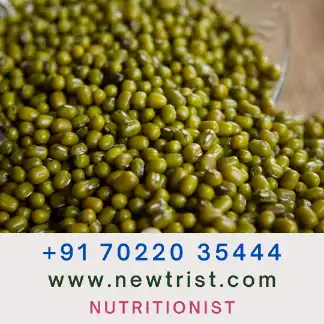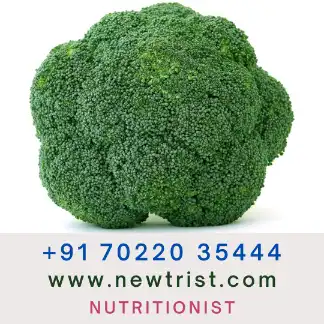The 7-day PCOD diet chart for weight loss includes a week’s healthy menu for morning drinks, breakfast, soup, salad, lunch, evening snacks, and dinner.
PCOD Indian Diet Chart For Weight Loss
The PCOD Indian diet chart for weight loss includes fiber-rich foods like green gram sprouts and millet roti which aids in weight loss. Reduced carbohydrates, adequate protein, and low-fat consumption are the key factors that aid in weight loss.
Day 1 Diet Chart
- Early morning drink @ 6:30 am: Lemon water
- Breakfast @ 9 am: Moong dal crepes + sambhar + green chutney/ tomato chutney
- Mid-morning meal @ 11 am: Green gram sprouts
- Lunch @ 1 pm: Millet roti + palak paneer gravy + carrot sabzi
- Evening snack @ 4 pm: Spicy puffed rice/ murmura
- Dinner @ 7 pm: Finger millet roti with tomato chutney
Consult 19 years experienced Chief Nutritionist Vasanthi for expert advice and a personalized diet plan. In-person consultation at HSR, Koramangala, Bellandur, Haralur, and video consultation across India.
- Consultation INR 750
- 1 Week personalized diet plan INR 2000
- 1 Month personalized diet plan INR 4000
- 3 Months personalized diet plan INR 9000

Table of Contents
What is PCOD?
PCOD (Polycystic Ovarian Disease) is a condition where the immature/partially mature eggs are released by the ovaries and turned into cysts.
Irregular and painful menstrual periods, pain in the pelvis, acne breakouts, and fertility issues are some of the symptoms of PCOD. About one-third of women are affected by PCOD problems.

PCOD Diet Plan For Weight Loss
The PCOD diet plan for weight loss contains ingredients like sprouts, soup, broccoli, brown rice, and bajra that keep you full for a longer time. The fibers present in these foods aid in effective weight loss.
The dal tadka and seeds chikki provide the necessary proteins needed for weight management.
Day 2 Diet Plan
- Early morning drink @ 6:30 am: Chamomile tea
- Breakfast @ 9 am: Sprouts, zucchini, and carrot pancakes
- Mid-morning meal @ 11 am: Palak ginger soup
- Lunch @ 1 pm: Brown rice with dal tadka and bitter gourd sabzi
- Evening snack @ 4 pm: Mixed seeds chikki
- Dinner @ 7 pm: Methi bajra paratha and pear slices

PCOD Food Chart For Weight Loss
The PCOD food chart for weight loss contains nutritious foods like oatmeal, millet rice, avocado salad, boiled egg, and nuts which provide the necessary nutrients to stay energetic all through the day.
Drinking aloe vera juice in the morning has been found to reduce the fasting blood glucose levels in type 2 diabetic patients.
Day 3 Diet Plan
- Early morning drink @ 6:30 am: Aloe juice
- Breakfast @ 9 am: Oatmeal with almond milk and fruits
- Mid-morning meal @ 11 am: Garlic vegetable soup
- Lunch @ 1 pm: Millet rice with ridge gourd sabzi and stir-fried bhindi
- Evening snack @ 4 pm: 1 boiled egg + 5 walnuts
- Dinner @ 7 pm: Oats upma

PCOD Menu For Weight Loss
The PCOD menu for weight loss consists of ragi rava dosa, mixed sprouts, brown rice, and dhokla which are low in fats and high in fiber and essential minerals for the regular functioning of the body.
The quinoa upma contains vegetables that provide vitamins and fiber for the enrichment of the body cells.
Day 4 Diet Plan
- Early morning drink @ 6:30 am: Ginger water
- Breakfast @ 9 am: Ragi Ravadosa with mint chutney
- Mid-morning meal @ 11 am: Homemade dry fruit chikki
- Lunch @ 1 pm: Brown rice + fish curry + mixed sprouts sabzi
- Evening snack @ 4 pm: Dhokla
- Dinner @ 7 pm: Quinoa upma

PCOD Meal Plan For Weight Loss
The PCOD meal plan for weight loss contains apple cider vinegar that provides numerous benefits in addition to assistance in weight loss. Poha is an energetic fat-free breakfast option for PCOD patients who struggle to lose weight.
Low GI fruits help to gain control over blood glucose levels and improve insulin sensitivity. Roasted makhana and wheat dosa supply the body with the necessary fibers.
Day 5 Diet Plan
- Early morning drink @ 6:30 am: Apple cider vinegar drink
- Breakfast @ 9 am: Poha with veggies and orange juice
- Mid-morning meal @ 11 am: Low GI fruits
- Lunch @ 1 pm: Brown rice + Rasam + cabbage stir fry
- Evening snack @ 4 pm: Roasted makhana
- Dinner @ 7 pm: Wheat dosa + roasted chana dhal chutney

PCOD Vegetarian Diet Chart For Weight Loss
The PCOD vegetarian diet chart for weight loss consists of multigrain khichdi, millet cookies, vegetable pulav, and ragi ladoo which are rich in fiber and proteins.
The use of jaggery in ragi ladoo turns out to be a healthy and tastier version. The antioxidants in cinnamon tea help in reducing inflammation during PCOD.
Day 6 Diet Plan
- Early morning drink @ 6:30 am: Cinnamon tea
- Breakfast @ 9 am: Multigrain khichdi
- Mid-morning meal @ 11 am: Millet cookies
- Lunch @ 1 pm: Vegetable pulao with eggplant sabzi
- Evening snack @ 4 pm: Ragi and jaggery laddoo
- Dinner @ 7 pm: Bajra roti with cauliflower sabzi

Best Diet For PCOD To Lose Weight
The best diet for PCOD to lose weight includes dahlia upma, nuts, and baked vegetable cutlets that supply the necessary energy, vitamins, and minerals.
The cucumber water makes your morning refreshing and kickstarts your day for a steady workout. The grilled fish serves as a good source of protein and avocado salad provides the benefits of healthy fats.
Day 7 Diet Plan
- Early morning drink @ 6:30 am: Cucumber water
- Breakfast @ 9 am: Dahlia upma
- Mid-morning meal @ 11 am: A handful of walnuts/peanuts
- Lunch @ 1 pm: Whole wheat pasta with vegetables
- Evening snack @ 4 pm: Baked vegetable cutlet
- Dinner @ 7 pm: Grilled fish with avocado salad

Foods to avoid during PCOD
Some foods must be avoided to minimize the symptoms of PCOD.
- Carbs that have been refined (White rice, white bread, pasta, cakes, and bakery products)
- Fried foods
- Sugary beverages
- Cured meats (Sausages, Hamburgers, and Hotdogs)
- Packaged foods (Chocolates, candies, sweetened yogurt, ice creams, and chips).
Intake of refined carbohydrates should be completely avoided as it forms the base for insulin resistance and inflammations. These consist of highly processed foods like
- Sliced bread
- Muffins
- Desserts
- Pastries
- White flour.
White flour is commonly used to prepare all kinds of junk foods like noodles, pasta, cookies, donuts, and bread. These foods contain negligible amounts of fiber and are high in simple carbohydrates.
- Insist on whole wheat flour and multigrain flour that is rich in fiber to prepare foods that are made with white flour.
- Choose foods that contain a low-glycemic index like whole grains, legumes, non-starchy vegetables
- Include foods that are low in fat content like low-fat dairy products
- Add more fruits and vegetables that are rich in fiber
- Choose millet-based foods.
Check out for different names of sugars in the food labels like fructose, Sucrose, and Dextrose.
- Cut down on inflammatory foods like margarine, processed meats, fried foods, sugary foods, and drinks like sodas and sweetened fruit juices when you follow a PCOD diet.
- Processed foods contain a lot of trans fats, saturated fats, salt, sugar, and preservatives that can worsen your PCOD symptoms.
- Fried foods pose a lot of health problems in addition to PCOD. Plan a healthy diet chart and follow them strictly to stay away from unhealthy foods.
- It is advised to stay away from soy products as it creates hormonal imbalances, and affects thyroid functions and ovulation.
- Substitute oats milk for regular milk, millet and brown rice for normal white rice, and lean proteins like eggs and fish for meats and fatty foods.
Fast foods that are commonly found on the corners of every street contain a lot of harmful fats. These foods that are cooked in oil are high in saturated and trans fats.
These foods increase the risk of weight gain, cardiac problems, pregnancy issues, cancer, diabetes, and other health issues.
Soft drinks and sweetened juices are among the sneaky ways that affect PCOD symptoms as they are fully drenched in sugars.
High levels of sugars present in the foods increase the release of insulin and the excess sugars are stored as fats in the body.
Restrict the use of processed foods and meats if you have PCOD as they are highly inflammatory and high in saturated fats. Inflammatory foods are not advisable during PCOD conditions.
Maintain the health of your reproductive system by choosing lean meats like chicken and turkey instead of red meats and processed ones. Red meats lower progesterone levels and induce inflammation.
FAQs
How can a PCOD patient lose weight?
Losing weight with PCOD might be challenging, but it can be made possible with dietary changes, physical exercises, and hard work. Weight loss might be slow and steady. Modifications in diet and lifestyle changes can reduce the risk of other health issues.
Why is it difficult to lose weight with PCOD?
Weight loss with PCOD might be difficult because of hormonal changes. Women without hormonal imbalances tend to lose weight faster when compared to women with PCOD which causes an imbalance in hormones. Insulin resistance and inflammation slow down the process of weight loss.
Does PCOD cause belly fat?
Women with PCOD can develop belly fat like males due to changes in metabolism, increased production of androgens, and hormonal imbalances. PCOD occurs in women due to poor lifestyles and stress. Proper meal planning and physical activity can help women lose belly fat.
What is the PCOD diet plan?
The PCOD diet plan consists of high fiber, moderate protein, good amounts of healthy fats, and reduced intake of carbohydrates and fried foods. Check for low glycemic index foods to manage your insulin levels. Choose whole foods instead of refined ones. Include foods that contain anti-inflammatory properties.
Can weight loss help with PCOD symptoms?
Yes, weight loss can help improve your PCOD symptoms and reduce your insulin resistance. A small difference in weight can improve your PCOD symptoms and regulate your menstrual cycle. Following better sleep routines and stress management can aid in weight loss with PCOD.
What is the best diet for PCOD and weight loss?
The best diet for PCOD and weight loss include more whole grains, fruits, vegetables, nuts, and seeds, and restrict processed foods, sugary foods, fried foods, and foods high in saturated and trans fats. Including spices like turmeric and cinnamon can help in weight loss with PCOD.
How much weight should I lose with PCOD?
A 5-10% reduction in weight can cause improvement in PCOD symptoms. Insulin resistance, reproductive issues, hormonal imbalances, irregular periods, unwanted hair growth, and ovarian functions can be improved with weight loss. PCOD cannot be cured completely, but its effects can be reduced to a greater extent for overall health and wellness.
How can I lose weight with PCOD and insulin resistance?
Losing weight with PCOD and insulin resistance can be achieved by modifying the diet to a healthier version and avoiding certain foods that contribute to weight gain and affect the body. Physical exercise plays a major role in weight loss to keep one fit and healthy.
How to increase metabolism with PCOD?
Increased secretion of androgen, the male hormone alters the metabolic process going on in the system and impairs insulin functions. Get enough fiber-rich foods like fruits, vegetables, and whole grains, and adequate protein with the exclusion of fried and sugary foods that provides nothing but empty calories.
How and when should I consume chia seeds for PCOD and weight loss?
Chia seeds are rich in essential amino acids and minerals like calcium, magnesium, and iron and serve as an excellent addition to the PCOD diet. Soaked chia seeds can be added to smoothies, morning detox drinks, and oatmeal. Slightly roasted chia seeds can be thrown over salads and puddings. The best time to consume chia seeds is in the morning. Chia seeds are rich in fiber and make you feel full for a longer time.
How do I reduce weight with PCOD and irregular periods?
Reducing weight with PCOD and irregular periods is possible by following a diet rich in vegetables, fruits, whole grains, nuts, and seeds. Consume fermented and probiotic foods to maintain your gut health and control your appetite. Skip inflammatory foods like cakes, cookies, and refined, and processed foods. Combine exercise with healthy food intake for faster results.
What is the role of diet in managing PCOD and achieving weight loss?
A diet rich in fruits and vegetables with a low-glycemic index helps in the regulation of the menstrual cycle by managing insulin sensitivity. Increased levels of insulin impair hormonal balance by which the blood sugar levels remain high. The fiber and protein content keeps you full, reducing your hunger which aid in weight loss.
What is the benefit of low-carb diet for PCOD?
The benefits of a low-carb diet for PCOD include reduced insulin resistance and effective weight loss. A decrease in BMI and blood cholesterol levels are noticed with a low-carb diet. Include high-fiber and foods containing complex carbohydrates to avoid the sudden spike in blood sugar levels. Restoration of ovulation is made possible with a low-carb diet in PCOD.
What are the potential benefits of a gluten-free diet in PCOD?
The gluten-free diet helps in reducing inflammation in PCOD patients which can improve PCOD symptoms. When you are on a gluten-free diet, you automatically avoid foods that are processed that are usually high in gluten. The gluten-free diet promotes good health, and increased energy, and helps in weight loss.